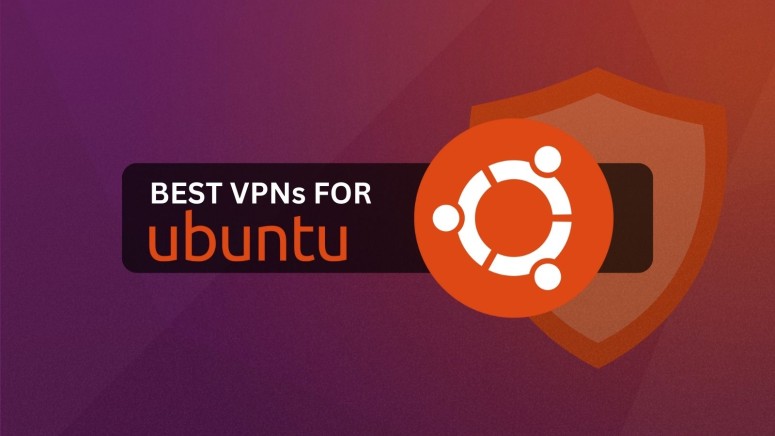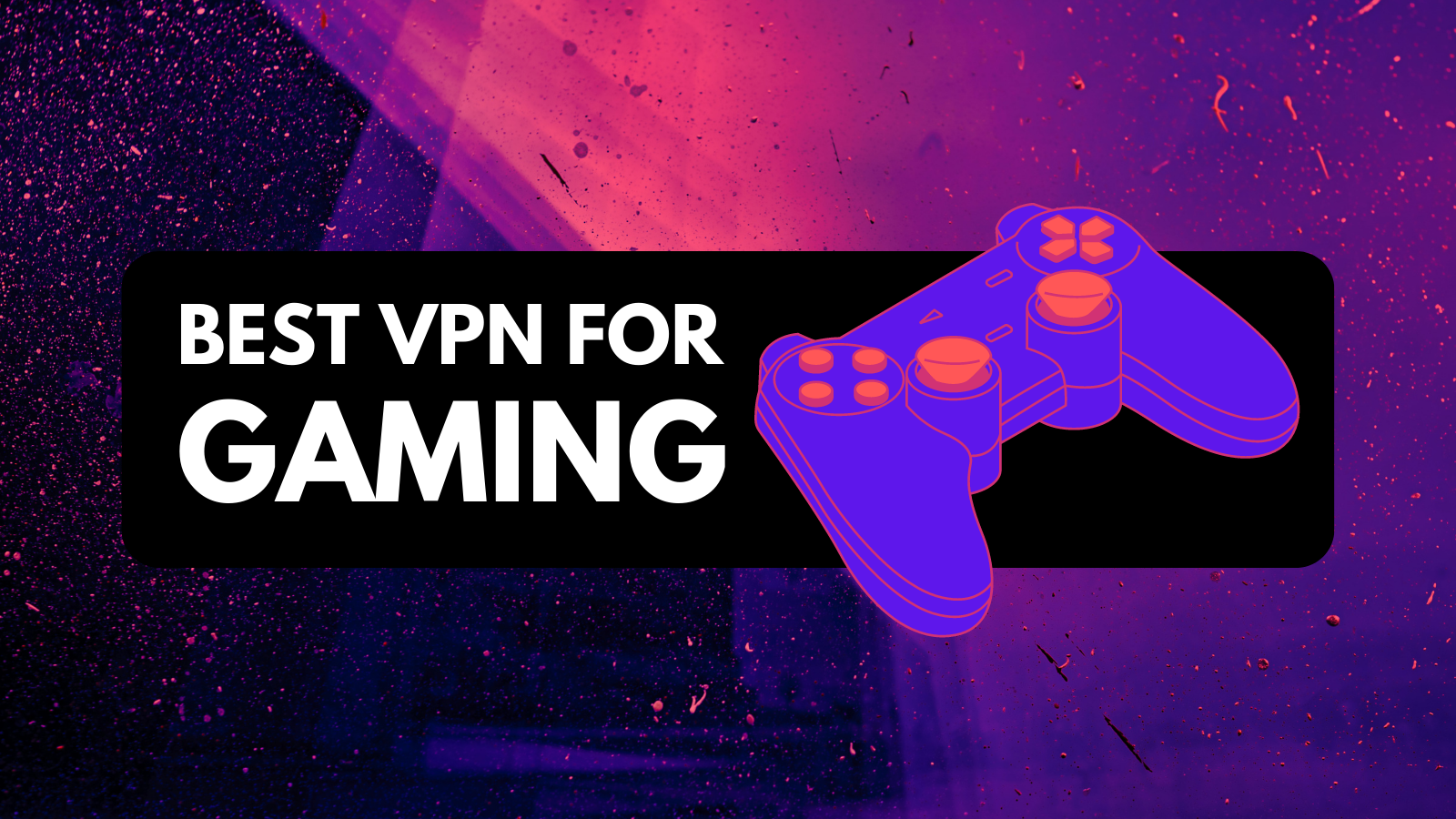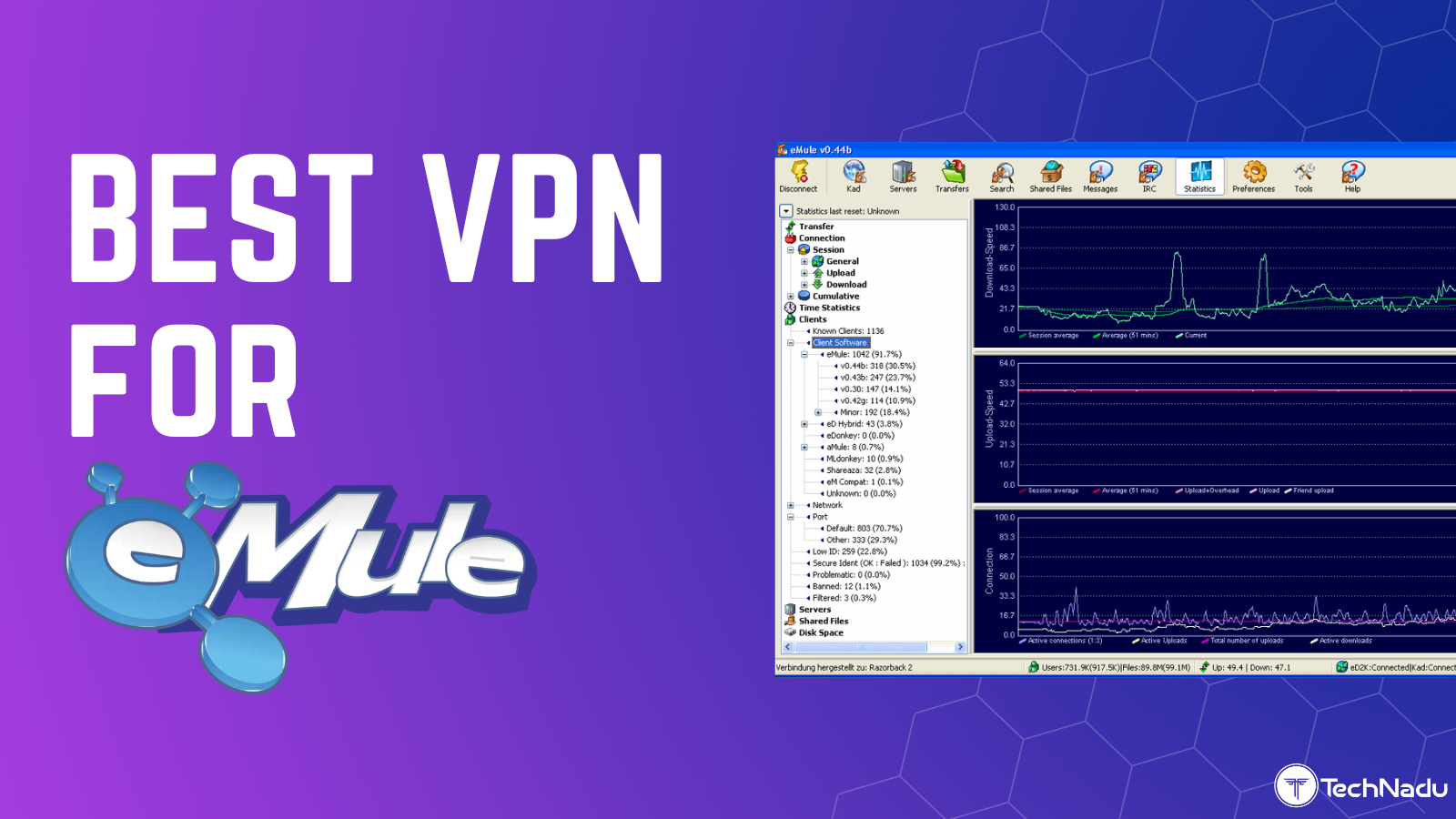When you purchase through links on our site, we may earn an affiliate commission. Here’s how it works.
5 Best VPNs for Ubuntu in 2026
Our experts have reviewed 53 VPN providers, which were put through extensive rounds of testing. To learn more about that process, here’s how we review VPNs, where we explain our criteria and our policy of being fully transparent.
Ubuntu is a Linux-based OS known for its localized security, but it has its downsides. Although it has a built-in VPN, it is limited in features and capabilities. That makes it harder for users to protect their personal data and online activities. Another problem is that many VPNs aren't compatible or easy to install on the OS.
The answer is to use the best VPN for Ubuntu. A VPN will ensure secure data transmission and protect your information from potential threats. Moreover, with a service optimized for the Linux distro, installation and configuration will be easy. Plus, using a VPN will allow you to unblock all kinds of geo-restricted content.
In this article, we did the heavy lifting for you by providing an overview of the top 5 Ubuntu VPNs. We'll also share all the benefits of using a VPN, show you how to install a VPN on Ubuntu, explain how to choose the best VPN, and much more.
Best Ubuntu VPNs - Our Shortlist
- NordVPN – Our #1-Rated Best VPN for Ubuntu in 2026
- Surfshark – Best Ubuntu VPN with Unlimited Simultaneous Connections
- ExpressVPN – Blazing-Fast and Reliable No-Logs VPN
- CyberGhost VPN – Intuitive VPN with Streaming-Optimized Servers
- Private Internet Access – Highly Customizable and Secure VPN
How to Set Up a VPN on Ubuntu
To set up a VPN on Ubuntu, you will have to get a subscription to a VPN that's compatible with this operating system and configure it on your computer. Here are some simple instructions to follow:
- Subscribe to a premium VPN that works on Ubuntu (we recommend NordVPN).
- Open your provider's website and locate its Linux installation instructions.
- Download and install the VPN via the command line or setup wizard.
- Launch and log in to the VPN client with your credentials.
- Connect to a VPN server of your choice.
- Now you can access restricted websites and enjoy secure and private surfing.
Don't worry if you can't connect a VPN to Ubuntu using a setup wizard. There are other methods you can use, such as Linux's Terminal or Ubuntu's Network Manager. This guide will give you some alternative ways to set up a VPN on Ubuntu.
The Best VPNs for Ubuntu in 2026
To make sure you get the best VPN for Ubuntu, adhere to the criteria we've created in our article on the best VPN for multiple devices. To start, you must subscribe to a VPN client that is fully compatible with Ubuntu. It should also be available on many other platforms and give you the ability to create plenty of simultaneous connections.
To strengthen your privacy and security, look for a no-logs VPN with high-end encryption and plenty of advanced protocols. An ideal VPN will also have extra features, such as a kill switch, an ad blocker, and split tunneling.
The best service will offer a huge global server network with strong unblocking capabilities. This way, you can access restricted websites and popular streaming platforms. Moreover, get a VPN that has impressive speeds and consistent performance. A solid refund policy is also important in case you're not impressed, as is 24/7 live chat support to help with any issues.
Based on those criteria, here are the 5 highest-rated Ubuntu VPNs:
1. NordVPN – Our #1-Rated Best VPN for Ubuntu in 2026
NordVPN is the best VPN for Ubuntu because it has a native app fully optimized for Ubuntu that is operated via a command-line interface (CLI). It will work even on older distros. This VPN also supports Windows, macOS, Android, and iOS computers, smartphones, tablets, and more. You can make up to 6 simultaneous connections with one subscription.
This provider has a healthy global network of over 5,800 servers in 60 countries. It also offers many high-end VPN protocols, such as NordLynx, OpenVPN, and IKEv2/IPsec. NordVPN provides consistent performance and very high speeds, making it one of the fastest VPNs.
NordVPN also boasts amazing unblocking capabilities, so you'll be able to access all websites and streaming platforms around the world. Your outgoing data is completely safe thanks to its AES 256-bit encryption, which makes it unreadable to third parties.
This is also a no-logs VPN that uses RAM servers—thus, it’s unable to save your information. For additional security, there are various leak protection tools. Its kill switch will prevent your identity from spilling online in case something goes wrong. There's also split tunneling, which lets you create an exclusive VPN connection for certain apps, as well as an ad blocker.
If you aren’t able to install NordVPN on Ubuntu, simply get in touch with its customer service through 24/7 live chat support. Furthermore, if you change your mind, you can get a refund within the first 30 days.
PROS
- Completely compatible with Ubuntu
- Best security and privacy available
- 30-day money-back policy
- 24/7 support via live chat
- Strong unblocking capabilities
CONS
- Doesn’t allow many simultaneous connections
2. Surfshark – Best Ubuntu VPN with Unlimited Simultaneous Connections
Surfshark is one of the more affordable Ubuntu VPNs that uses a graphical user interface (GUI). Its native app is compatible with Ubuntu 20.04 and up and can be installed via Terminal. This VPN is also available on Windows, iOS, Android, and macOS devices of all kinds. With one subscription, Surfshark lets you create unlimited simultaneous connections.
After you set Surfshark up, you can choose between 3,200+ servers in 100 countries. It has multiple high-end VPN protocols, including WireGuard, OpenVPN, and IKEv2. With it, you will get reliable performance and ultra-fast speeds, so you can expect to browse the Web without issues.
This is a no-logs VPN that puts emphasis on user privacy. All your outgoing data is scrambled by AES 256-bit encryption. In addition, you'll get a powerful kill switch and CleanWeb, an ad blocker will also get rid of malware and trackers. Its Bypasser split tunneling feature also lets you choose which apps to protect with VPN encryption.
Moreover, with its Nexus Technology enabled, this VPN will constantly rotate your IP address and further enhance your security. Beyond that, Surfshark provides solid unblocking capabilities, giving you access to any website or streaming platform available.
Surfshark allows 24/7 access to customer service via live chat, which is convenient if you have issues installing this VPN on Ubuntu. Plus, if it doesn't impress you, you'll have 30 days to use the refund policy and get your money back.
PROS
- Fast and reliable speeds
- Unlimited simultaneous connections
- Works well with Ubuntu
- 30-day refund guarantee
- 24/7 live chat customer support
CONS
- Expensive monthly subscription
3. ExpressVPN – Blazing-Fast and Reliable No-Logs VPN
ExpressVPN is another reliable service that is compatible with Ubuntu 20.04+. Its native app has a CLI interface and can be quickly installed via Terminal. There are also apps for most modern platforms, including Windows, Android, macOS, and iOS smartphones, tablets, and computers. A single subscription will allow you to protect up to 8 devices simultaneously.
This VPN has a network of 3,000 servers in 105 countries. Thanks to premium VPN protocols such as Lightway, OpenVPN, and IKEv2, you can expect dependable performance with blazing-fast speeds. ExpressVPN impressed us with its handling of long-distance connections.
ExpressVPN has a strict no-logs policy, so none of your user information will be stored on its servers. Your outgoing data is always protected thanks to the AES 256-bit encryption. There is also a kill switch that will protect you in case your VPN connection suddenly drops. Plus, the ad blocker will identify and remove ads while browsing, increasing loading speed.
With ExpressVPN’s powerful unblocking capabilities, you’ll be able to access all websites and streaming services without issue. There's also split tunneling available, so you can manage which apps use VPN traffic.
You can also install ExpressVPN on Ubuntu through the OS’s Network Manager, if you have any issues with Terminal. If this doesn't work, get in contact with its 24/7 customer service, available via live chat. Furthermore, thanks to its 30-day refund guarantee, you aren't taking any risks by subscribing to this service.
PROS
- Fast and secure no-logs VPN
- Compatible with many devices
- Fully optimized for Ubuntu
- 30-day refund policy
- Unblocks restricted websites and platforms
CONS
- More expensive than similar VPNs
4. CyberGhost VPN – Intuitive VPN with Streaming-Optimized Servers
CyberGhost is our next premium VPN optimized for Ubuntu. You can quickly install its native CLI app through Linux's Terminal. It is supported on Ubuntu 20.04, 18.04, and 16.04. Compatible with Windows, iOS, Android, and macOS platforms, this VPN is also available on many other devices. On top of that, it allows up to 7 simultaneous connections.
This VPN has an impressive network of 9,300+ servers in 100 countries. Plenty of them are optimized for streaming, torrenting, or gaming. CyberGhost offers solid unblocking capabilities, so accessing streaming services and geo-restricted websites is easy.
There's support for multiple VPN protocols, including WireGuard and OpenVPN. Thanks to them, CyberGhost delivers medium-fast speeds and consistent performance. Security is covered by AES 256-bit encryption, which scrambles your data. Moreover, this is a no-logs VPN, so your private info won't be stored on its servers.
You can further improve your security and create an exclusive VPN tunnel by using split tunneling. On top of that, any ads, trackers, or malware will be neutralized via an advanced ad blocker, while CyberGhost's kill switch will prevent identity leaks in case something goes wrong.
If, for whatever reason, you can't install CyberGhost VPN on Ubuntu, just contact their 24/7 live chat support to get help. Even better, this VPN also has a generous refund policy, giving you 45 days to test it out.
PROS
- Large worldwide server network
- Works with many Ubuntu distros
- Servers optimized for streaming
- 45-day refund guarantee
- Available on most modern devices
CONS
- Only capable of average speeds
5. Private Internet Access – Highly Customizable and Secure VPN
Private Internet Access (PIA) is a secure VPN that's fully compatible with Ubuntu 18.04+. Impressively, its native app comes with a GUI, which is a bit rare. Besides support for Windows, macOS, Android, and iOS devices, PIA can be installed on routers, gaming systems, and more. You can protect your whole home network thanks to its unlimited simultaneous connections.
This VPN provides access to thousands of servers located in 84 countries. With multiple advanced VPN protocols available for use (like OpenVPN and WireGuard), you can expect stable performance on all its servers. Unfortunately, PIA delivers the slowest speeds of all the VPNs on this list.
However, PIA has solid security, which is mainly handled by AES 256-bit encryption. On top of that, you have a kill switch and its MACE feature (which includes an ad blocker). There's even split tunneling, so you can manage which apps use your VPN connection. Moreover, your privacy won't be an issue thanks to its no-logs policy.
PIA has excellent unlocking capabilities, so you won't have trouble with opening any websites or streaming services. It even has servers optimized for streaming.
You’ll be able to get a refund within 30 days if PIA isn't working out for you. Furthermore, if you can't set up a VPN on Ubuntu with PIA easily, make sure to contact it 24/7 live chat support for professional troubleshooting.
PROS
- Fully compatible with Ubuntu
- Allows unlimited simultaneous connections
- Biggest global server network available
- 30-day refund period
- Includes many leak protection features
CONS
- Subpar connection speeds
Best VPNs for Ubuntu: Compared
Why Do You Need a VPN for Ubuntu?
You need a VPN for Ubuntu because it will significantly improve your privacy and security and let you unblock restricted content. Other benefits of using an Ubuntu VPN include:
- Conceal Your Browsing Activity – A VPN encrypts your Internet traffic, preventing ISPs, government agencies, and hackers from following your online activities.
- Hide Your IP Address – Using a VPN conceals your real IP address, adding a layer of privacy and security to your online presence.
- Bypass Bandwidth Throttling - ISPs frequently use bandwidth throttling to slow your connection if they notice that you are using a lot of data. With a VPN, your ISP won't be aware of your data consumption, so your speed will remain unaffected.
- Avoid Local Censorship – VPNs enable access to websites, apps, and platforms that may be blocked by your government for various reasons, ensuring online freedom.
- Unblock Global Content – By connecting to servers in different countries, you can access streaming platforms and websites that are otherwise geo-restricted.
- Access Local Content When Traveling – If you're currently abroad, you can use a VPN to connect to servers in your home country and unblock local websites.
- Connect Safely to Public Wi-Fi – Public networks are notoriously unsafe, and using them can make you a prime target for hackers. A VPN will encrypt your connection and protect you from possible cyberattacks.
- Improve Gaming Experience – By connecting to VPN servers that are closer to game servers, you can reduce lagging. You can also protect yourself from any DDoS attacks.
- Avoid Price Discrimination – Certain online merchants and services offer different prices based on your location. A VPN can help you find the best deals by connecting you to servers in different countries.
- Shop Safely Online – VPNs protect your personal and financial data when shopping online, minimizing the risk of fraud and identity theft.
- Secure Torrent Downloads – A premium VPN service will offer a kill switch, which prevents data leakage if your VPN connection fails while torrenting.
How to Choose the Best Ubuntu VPN?
To choose the best Ubuntu VPN, focus on finding a service easily configurable on the OS with high-end security. Of course, there are other key factors to consider:
- Support for Ubuntu – An ideal VPN provider will be fully compatible with multiple versions of the Linux OS.
- Support for Other Platforms – This service should also have support for a wide range of modern devices, such as Windows and macOS computers, Android and iOS smartphones, tablets, routers, and more.
- Simultaneous Connections – Get a VPN with many simultaneous connections, as this can let you protect your whole home network with a single subscription.
- Server Network Size – Look for plenty of server locations worldwide. This way, you will always be able to find servers with ideal performance that let you access geo-restricted websites.
- No-Logs Policy – Subscribe to a service that has a strict no-logs policy to protect your privacy. Better yet, if they use RAM-only servers, they aren't able to store any sensitive user data long term.
- VPN Protocols and Encryption – Find a VPN with military-grade AES 256-bit encryption, as it will shield your outgoing data from prying eyes. It must also support advanced VPN protocols like OpenVPN and WireGuard, which give you fast speeds and instant connections.
- Advanced VPN Features – Search for a VPN with extra tools that'll enhance your security and privacy. This includes a kill switch, split tunneling, leak protection, and a solid ad blocker.
- Website Unblocking Capabilities – Choose a VPN that can reliably unblock all restricted websites and streaming platforms.
- Performance and Speed – The best VPN provider will give you fast speeds even on remote servers. Its performance should be consistent no matter your location or time of day.
- Money-Back Policy – Make sure that the VPN in question has a money-back guarantee, which allows you to test the service risk free.
- Customer Support – A premium VPN app will give you 24/7 access to live chat support. This way, you can always get help if something unforeseen happens.
Can You Use a Free VPN for Ubuntu?
Yes, you can use free VPNs for Ubuntu, but we wouldn't recommend them. To start, free services have poor encryption. They offer fewer servers which tend to get overcrowded, leading to slower speeds.
For that reason, free VPNs impose bandwidth limits, so they aren't suitable for activities like streaming. These are barebones services, so you can forget about extra features like split tunneling.
Finally, many of them even contain malware and are designed to extract user data. Your sensitive info is then sold to ad agencies, which is how these services make a profit. All in all, a free VPN for Ubuntu tends to cause more trouble than it’s worth.
A better approach is to use a trial of a premium VPN for Ubuntu. If you are still unsure about which one you want, check our alternative guide on the best VPN services.
Final Thoughts
Ubuntu uses a built-in VPN which is outdated and can undermine your online security and privacy. This is problematic since many users want to protect their personal data and online activities. Also, many VPNs aren't compatible with Linux distros or have installation processes that are too complex. That’s why you need the best Ubuntu VPN.
We recommend NordVPN as the best VPN for Ubuntu. It provides high-end security with its AES 256-bit encryption, and privacy is covered with a no-logs policy. Plus, it can be easily installed on the OS, has plenty of high-speed servers, and can unblock any site or platform you desire.
And that's all you need to know about finding the best VPN for Ubuntu. Make sure to leave a comment below if you've got any questions we haven't covered. Thank you for reading!









